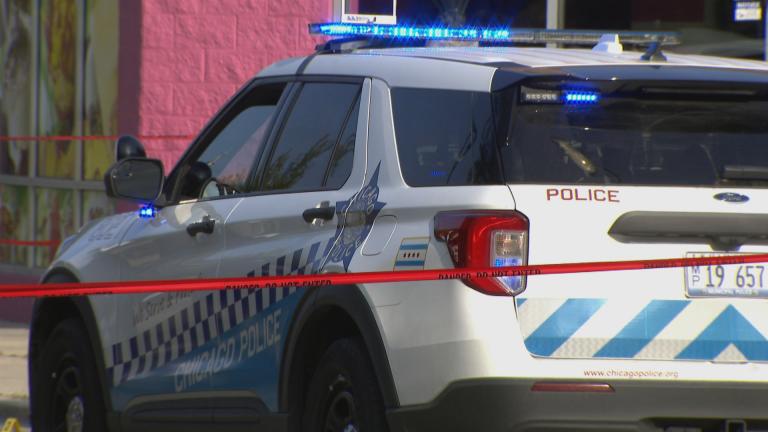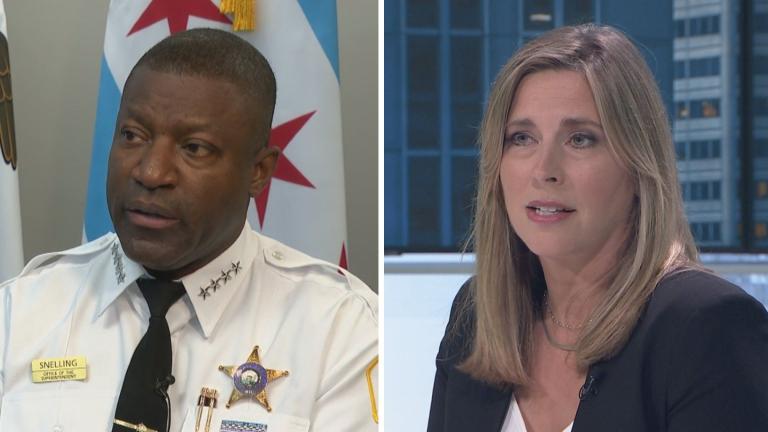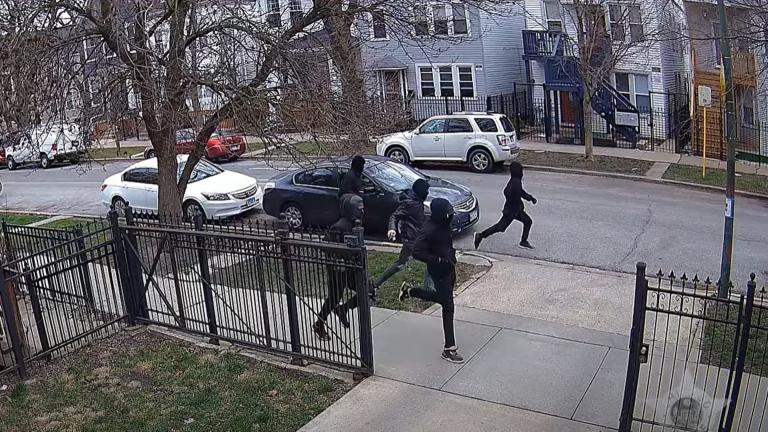This story is part of Policing: A “Chicago Tonight” Special on the anniversary of George Floyd’s murder.
Community activists and lawyers engaged in efforts to reform the Chicago Police Department have blasted Mayor Lori Lightfoot and CPD leadership for failing to move quickly on implementation of a court-mandated consent decree that is supposed to ensure change.
“The consent decree requires meaningful engagement between impacted communities and the solutions to violent and racist policing. I think that the city has shown that they don’t actually believe the community has input that is worth taking,” said Nusrat Choudhury, legal director at the American Civil Liberties Union of Illinois. “The mayor is not living up to her commitment as a candidate and that is deeply, deeply disappointing to communities of color in the city of Chicago.”
Chicago has a long history of racist and violent policing in Black and brown communities. The consent decree has been in place since the beginning of 2019 following a U.S. Department of Justice investigation that found the city’s police department “engage in a pattern and practice of using force, including deadly force, that is unreasonable.”
The 2017 DOJ report highlighted the lack of a foot pursuit policy for police officers, an issue that has been consistently highlighted as a problem by advocates for reform, and which has once more come to the fore following the shooting of 13-year-old Adam Toledo in March.
The DOJ report said that police officers were often reckless in their use of force.
“We found that officers engage in tactically unsound and unnecessary foot pursuits, and that these foot pursuits too often end with officers unreasonably shooting someone – including unarmed individuals,” the authors of the report wrote. “Among the most egregious uses of deadly force we reviewed were incidents in which CPD officers shot at suspects who presented no immediate threat.”
University of Chicago Law professor Craig Futterman, who is a member of a community working group on police reform, says that had a foot pursuit policy been in place, Toledo might still be alive.
“The DOJ issued this report in 2017 and made these findings known to the police department and said that this was necessary,” said Futterman. “A third of the instances where police officers kill people began with a foot pursuit.”
Choudhury says that the lack of any restrictions on when officers could engage in a foot pursuit was found by the DOJ to be “directly related to the pattern of the use of excessive force against communities of color in Chicago.”
Roxanne Smith is a leader at Communities United, a grassroots organization working for racial justice and police reform. Seventeen years ago her son Seneca was shot six times by police officers after being chased on foot. Officers alleged he pointed a gun at them and based largely on their statements he was arrested and convicted of attempted murder of a police officer despite no gun ever being found. He remains incarcerated.
Smith is especially critical of the police code of silence that often stops officers reporting misconduct committed by their colleagues.
“They just lied under oath,” said Smith. “I want to see change as far as the code of silence. When they know another officer has done something wrong and they just go along with it and cover for them … that is out of order. They need to be people of integrity. They need to have good character.”
The consent decree is supposed to force change in both practice and culture at the police department.
But the independent monitor who tracks the progress of the decree’s implementation reports the department and the city continue to blow through deadlines to actually make changes. And the most recent monitor’s report found the department continues to miss more deadlines than it meets.
“We have to be honest about what police presence looks like in communities of color across the city,” said Jessie Fuentes, an activist and educator at the Puerto Rican Cultural Center in Humboldt Park. She also spends a lot of time in Little Village and Pilsen and says she is skeptical of efforts by police to engage with communities of color.
“Is there a heavy presence by police officers in our community? Absolutely. I drove home last night, there were about 30 police officers just standing in one corner, but they were engaging with one another. They weren’t engaging with community. They weren’t building relationships with families. They’re not engaged with nonprofit agencies that are doing violence prevention work. What they are doing is taking up space and it often feels like they are creating fear in those spaces rather than building relationships.”
Futterman and Choudhury both struggled to identify any significant reforms that have been implemented.
The most significant change Futterman could point to was a change of policy that requires mandatory de-escalation before using force.
“I’d say that’s probably the most important thing that they have put into policy,” said Futterman. “But one of the significant issues is the wide gulf between what’s on paper and what’s happening in practice. While CPD mandates de-escalation we are still seeing officers using grossly excessive amounts of force.”
Despite the slow pace of implementing reforms, Futterman and Choudhury said they believed the consent decree would ultimately lead to real reform – even if that process is slow. Futterman said CPD could be under the consent decree for more than a decade until it convinces the court that real change has taken place, while Choudhury pointed to the profound problems at the department.
“CPD is the second largest police department in the country, and it clearly needs a top to bottom overhaul of its culture and how it interacts with human beings on the ground,” said Choudhury. “The change that is needed is so significant. And what the consent decree acknowledges is that there are steps the city can take to get on the path toward real reform, but none of it is possible if the city isn’t showing the political will to make that happen.”
Choudhury, who for 11 years worked at the national offices of the ACLU, said that the problems at the police department run very deep.
“The history and legacy of violence and police torture in the city is remarkable even by American standards. And this is in a country where policing itself is rooted in placing controls and institutions of control over people of color, but even in that context Chicago exceeds norms,” said Choudhury. “The legacy here is incredibly horrible. And it takes significant political will to want to do something about that and I don’t see that political will in this administration.”
Futterman said it is up to Mayor Lightfoot and police leadership to force change.
“I don’t hold false hope that the Fraternal Order of Police will suddenly change its heart and mind. I expect what we see, which is resistance to change,” said Futterman. “Change is not going to occur by letting things go on business as usual. It’s only going to occur if you have both a federal court and a federal judge and if you have police leadership and mayoral leadership in place that’s willing to rip that Band-Aid off. The folks at the top have not just the power but the responsibility to change the culture.”








